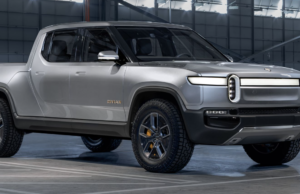Continental Tire Reviews
Continental is the fourth most popular tire manufacturer in worldwide sales, although they’re quite a bit behind major brands like Bridgestone, Michelin, and GoodYear. That being said, they’ve got one of the most complete and comprehensive sets of replacement tires for any road conditions or vehicle. Their products test well, but why is it that they can’t seem to close the gap between themselves and the three major manufacturers? In our Continental tires review, we’ll be looking at what tires this company offers, and seeing how they stack up against the competition. If you’re wondering if these tires have a place on your vehicle, this review will help you decide.
Overview
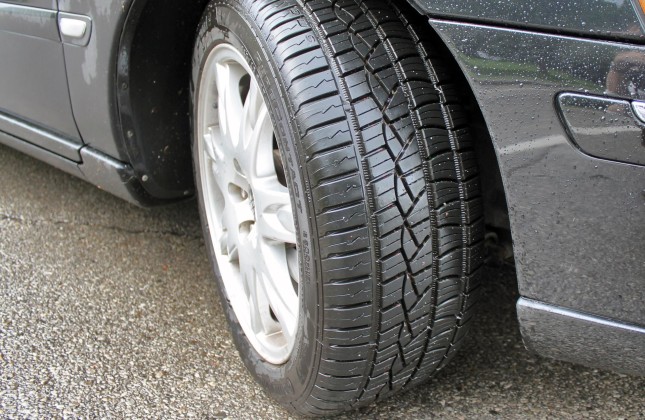 Continentals all season line is divided into three categories. They’ve got performance options, standard, and extreme performance all season rubber. Their performance line is covered by the PureContact tire. It’s available in two different speed ratings. The H rated tire is good for speeds up to 130 Mph or 210 Km/h. Where as the V rated tire is good for speeds of up to 149 Mph or 240 Km/h. Both versions performed very well in our tests. They have excellent braking on dry or wet ground, although ice breaking was below average. The large distance between the tread blocks allows them to perform very well in wet conditions, with very little chance of hydroplaning. To top it off, they provide a comfortable ride with low noise. They are rated for 55,000 miles, so they should last you a long time. The PureContact models are great for anyone in a snowy climate, who doesn’t often encounter large sheets of ice.
Continentals all season line is divided into three categories. They’ve got performance options, standard, and extreme performance all season rubber. Their performance line is covered by the PureContact tire. It’s available in two different speed ratings. The H rated tire is good for speeds up to 130 Mph or 210 Km/h. Where as the V rated tire is good for speeds of up to 149 Mph or 240 Km/h. Both versions performed very well in our tests. They have excellent braking on dry or wet ground, although ice breaking was below average. The large distance between the tread blocks allows them to perform very well in wet conditions, with very little chance of hydroplaning. To top it off, they provide a comfortable ride with low noise. They are rated for 55,000 miles, so they should last you a long time. The PureContact models are great for anyone in a snowy climate, who doesn’t often encounter large sheets of ice.
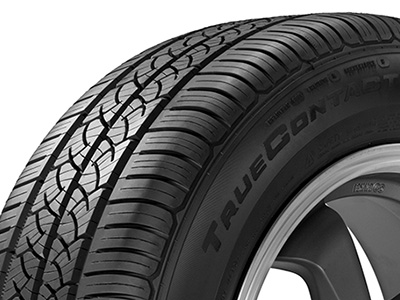 The Continental TrueContact tire is very similar in many regards, although designed for lower speeds. it has a speed rating of T, making it suitable for travel up to 118 Mph or 190 Km/h. Like the PureContact, it’s tests were above average is most regards. However, it’s not quite as good in the rain. Wet braking performance was average for the class. That being said, the tradeoff with this tire is that it is a bit cheaper, and has extremely low rolling resistance. Combined with a 90,000Km treatwear warranty (!!) this is a tire that can last you a very long time.
The Continental TrueContact tire is very similar in many regards, although designed for lower speeds. it has a speed rating of T, making it suitable for travel up to 118 Mph or 190 Km/h. Like the PureContact, it’s tests were above average is most regards. However, it’s not quite as good in the rain. Wet braking performance was average for the class. That being said, the tradeoff with this tire is that it is a bit cheaper, and has extremely low rolling resistance. Combined with a 90,000Km treatwear warranty (!!) this is a tire that can last you a very long time.
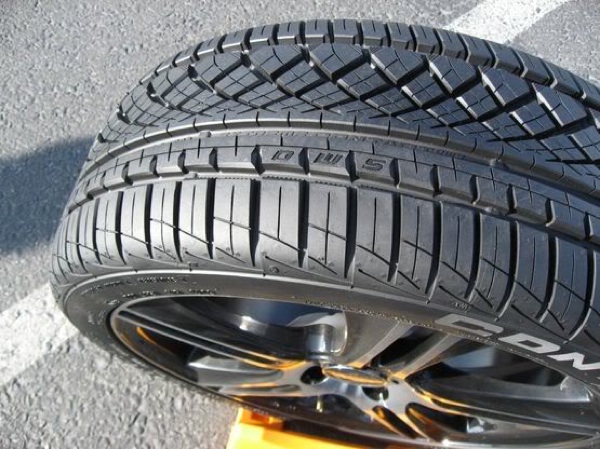 The Extreme Performance category is held up by the prestigious ExtremeContact line. These shoes have a speed rating of Y, making them suitable for the fastest cars on the market. The Y rating is rather new, being a subset of the older Z rating. It can travel at speeds of up to 186 Mph or 300 Km/h. It goes without saying, this tire is used primarily on exotic sports cars, although many hobby racers tend to purchase them as well. They offer some of the best dry braking performance we’ve ever seen, putting them right in line with the top tier tires. Handling is excellent in both dry and wet conditions, and they rarely hydroplane. That being said, these tires are below average in the snow. Despite their all-season rating, they are more of a 3 season tire, although they can be used year round in coastal areas. Because they have such an aggressive treat pattern, these tiers are good for 45,000 miles.
The Extreme Performance category is held up by the prestigious ExtremeContact line. These shoes have a speed rating of Y, making them suitable for the fastest cars on the market. The Y rating is rather new, being a subset of the older Z rating. It can travel at speeds of up to 186 Mph or 300 Km/h. It goes without saying, this tire is used primarily on exotic sports cars, although many hobby racers tend to purchase them as well. They offer some of the best dry braking performance we’ve ever seen, putting them right in line with the top tier tires. Handling is excellent in both dry and wet conditions, and they rarely hydroplane. That being said, these tires are below average in the snow. Despite their all-season rating, they are more of a 3 season tire, although they can be used year round in coastal areas. Because they have such an aggressive treat pattern, these tiers are good for 45,000 miles.
Truck Tires
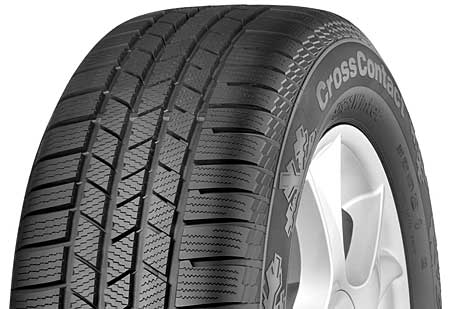 Continental makes two sets of tires for trucks, the CrossContact and ExtremeWinterContact models. The CrossContact tires go above and beyond the standards for all season truck tires. They’ve got a speed rating for 118 Mph, which is more than your typical truck tire. They have excellent braking performance in both dry and wet conditions, but like most truck wheels don’t handle sharp cornering particularly well. But even though handling is average for it’s class, they make up for it with ultra-low noise tread and a very soft ride. Since they’re good for 70,000 Km, you can be sure that they’ll last you quite some time.
Continental makes two sets of tires for trucks, the CrossContact and ExtremeWinterContact models. The CrossContact tires go above and beyond the standards for all season truck tires. They’ve got a speed rating for 118 Mph, which is more than your typical truck tire. They have excellent braking performance in both dry and wet conditions, but like most truck wheels don’t handle sharp cornering particularly well. But even though handling is average for it’s class, they make up for it with ultra-low noise tread and a very soft ride. Since they’re good for 70,000 Km, you can be sure that they’ll last you quite some time.
The ExtremeWinterContact tires are the next step up. They are are reasonably priced,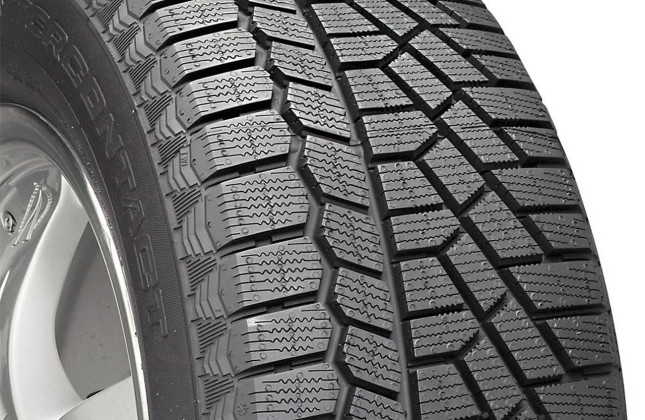 and good in cold conditions. They are rated best-in-class for snow traction, and have incredible braking performance on ice. The soft rubber used prevents them from hardening in cold conditions, and also provides a very smooth and comfortable ride. They have a speed rating of H, making them suitable for travelling at speeds of up to 130 Mph or 210 Kph. Although they perform very well in the snow, they have below average on dry ground, so make sure you change them out in the summer
and good in cold conditions. They are rated best-in-class for snow traction, and have incredible braking performance on ice. The soft rubber used prevents them from hardening in cold conditions, and also provides a very smooth and comfortable ride. They have a speed rating of H, making them suitable for travelling at speeds of up to 130 Mph or 210 Kph. Although they perform very well in the snow, they have below average on dry ground, so make sure you change them out in the summer
Continental Winter Tires
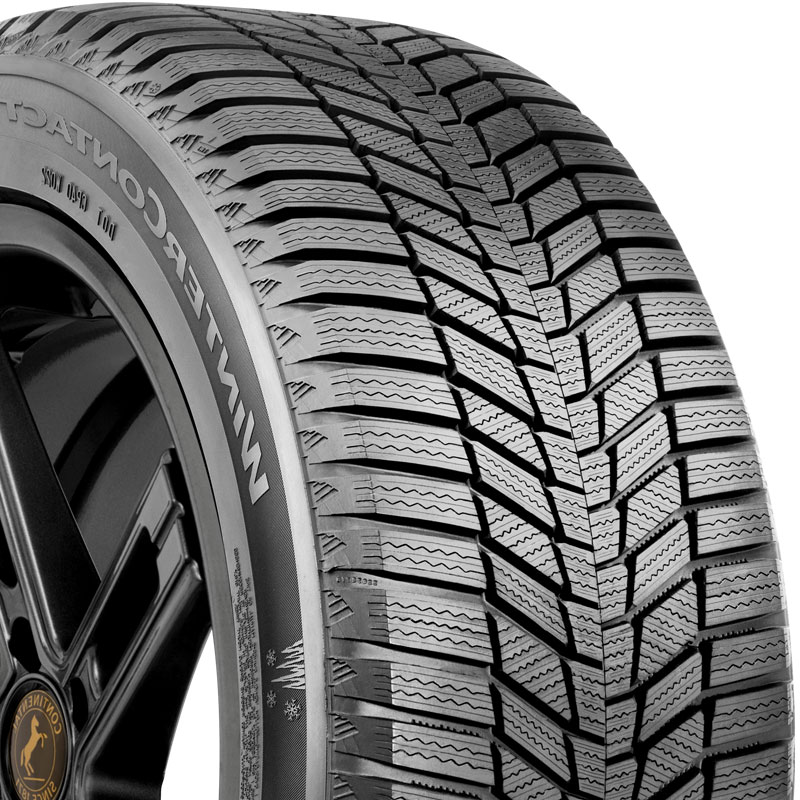 For standard vehicles, this brand has one winter tire. They call this the WinterContact SI, and it’s one of the best snow tires on the market. Although it’s far from cheap, it’s still not nearly as expensive as similarly rated options. it’s attained one of the best rated snow traction and ice braking ratings available, due in part to it’s large directional tread. It’s an extremely smooth tire, with very little resistance. It’s important to remember that this is a dedicated winter tire. Although performance is incredible in the snow, it does quite poorly in the rain or on hot, dry ground. if you want this tire to last a long time, it’s essential that you swap it out with a decent summer tire during the warmer months.
For standard vehicles, this brand has one winter tire. They call this the WinterContact SI, and it’s one of the best snow tires on the market. Although it’s far from cheap, it’s still not nearly as expensive as similarly rated options. it’s attained one of the best rated snow traction and ice braking ratings available, due in part to it’s large directional tread. It’s an extremely smooth tire, with very little resistance. It’s important to remember that this is a dedicated winter tire. Although performance is incredible in the snow, it does quite poorly in the rain or on hot, dry ground. if you want this tire to last a long time, it’s essential that you swap it out with a decent summer tire during the warmer months.
Want to See More Tire Reviews?
These continental tires will serve a lot of people well, but they aren’t going to be for everyone. Check out our other tires in this giant roundup guide where put them all head to head.
What We Like About Continental Tires
Continental had one of the most diverse and comprehensive sets of sizes and ratings available. Chances are, you’ll have no problem finding a model that will fit your vehicle. they excel in almost every environment they’re designed for, and generally much cheaper than the offerings from the big-three competitors.
Who Should Buy This Brand?
Continental tires are ideal for anyone who wants a top tier tire, but doesn’t want to spend a lot of money. In almost every circumstance, they perform just as well as the top rated models. That being said, you’re able to save a few dollars while you’re at it. Their winter models provide the best value, although the all season tires tend to be a little pricey. If we were going to use an all season as it was intended, we’d buy one set and call it a day. But if we lived in an environment where we had to own two sets of rubber, we’d pair their winter models with a summer tire from a cheaper brand.


